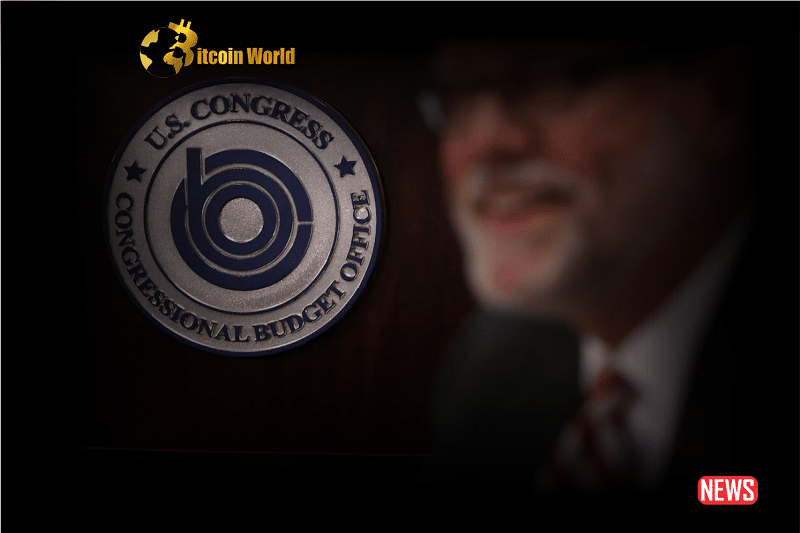Hold on to your hats, folks! The economic forecast just got a whole lot stormier. The Congressional Budget Office (CBO), the non-partisan scorekeeper in Washington, has dropped some jaw-dropping numbers about the U.S. budget deficit. Forget what you thought you knew – the deficit for 2023 is now projected to hit a staggering $1.7 trillion. Yes, you read that right. Trillion. With a ‘T’.
$1.7 Trillion Deficit? Let’s Break That Down
To put that into perspective, this new projection is a whopping 13% jump from the CBO’s forecast just four months ago. And it doesn’t stop there. Buckle up because the CBO predicts that these massive deficits aren’t a one-year blip. They anticipate the annual shortfall will hover between $1.6 trillion and $1.8 trillion for the next decade, eventually ballooning to a mind-boggling $2.9 trillion by 2033.
Think of it like this: imagine your household budget was millions of dollars in the red every year, and instead of shrinking, the debt just keeps growing. That’s essentially the picture the CBO is painting for the U.S. economy.
Why Should You Care About a Budget Deficit?
Okay, so big numbers are being thrown around. But why should the average person care about the U.S. budget deficit? Well, it’s not just an abstract economic concept; it directly impacts your life in several ways:
- Higher Interest Rates: To finance these deficits, the government borrows money. Increased borrowing can lead to higher interest rates across the board, affecting everything from your mortgage to credit card rates.
- Inflationary Pressures: Large deficits can sometimes contribute to inflation, eroding the purchasing power of your hard-earned dollars.
- Impact on Future Generations: A growing national debt means future generations will bear a heavier burden of repayment, potentially impacting their economic opportunities.
- Reduced Government Services: If a large portion of the budget goes towards interest payments on the debt, there might be less available for essential government services like infrastructure, education, and social programs.
“Economy Recovering, Deficit Exploding?” – CBO Director Sounds the Alarm
CBO Director Phillip Swagel didn’t mince words when discussing this concerning fiscal outlook in a CNBC interview. He highlighted a truly perplexing situation: “The economy is recovering, the labor market is almost back to normal, yet the deficit remains large.”
This isn’t your typical deficit story. Usually, when the economy strengthens, government revenues increase (thanks to higher tax collections), and deficits tend to shrink. But this time, the deficit is stubbornly refusing to budge, even with signs of economic improvement. Swagel pointed out that this financial gap is likely to persist despite anticipated economic growth. That’s a major red flag.
The Pandemic Hangover and More: What’s Driving This Deficit Surge?
So, what’s behind this alarming trend? The CBO report points to a few key factors:
- Legacy of Pandemic Spending: The massive government spending during the COVID-19 pandemic to support businesses and individuals has left a lasting impact. While necessary at the time, these programs contributed significantly to the national debt.
- Increased Mandatory Spending: Programs like Social Security and Medicare, known as mandatory spending, are projected to increase due to demographic shifts and rising healthcare costs.
- Higher Interest Rates (again!): Rising interest rates not only impact consumers but also increase the government’s borrowing costs, further exacerbating the deficit.
Can Economic Growth Save the Day? Don’t Bet On It.
Many might hope that strong economic growth will naturally solve the deficit problem. After all, a booming economy generates more tax revenue, right? While growth certainly helps, Director Swagel poured cold water on this idea, stating that even with “super optimistic growth,” it’s simply “insufficient to stabilize the country’s fiscal health.”
Think of it like trying to bail out a leaky boat with a small bucket while the hole keeps getting bigger. Economic growth is the bucket, and the ever-expanding deficit is the hole. You might make some progress, but you’re still taking on water faster than you can remove it.
Time for Tough Choices: Spending Cuts or Revenue Hikes?
Swagel’s message is clear: lawmakers need to make “difficult decisions.” What does that mean in plain English? It boils down to two main options:
- Curtailing Spending: This involves cutting back on government programs and initiatives. However, deciding which programs to cut is politically challenging and can have real-world consequences for people who rely on those services.
- Increasing Revenue: This means raising taxes. Tax increases are also politically sensitive and can be debated on who should bear the brunt – individuals, corporations, or both.
Neither option is easy or popular, but Swagel’s report suggests that inaction is no longer a viable path. The longer policymakers wait to address the deficit, the more challenging and potentially painful the solutions will become.
The Road Ahead: Navigating a Looming Fiscal Crisis
The latest CBO projections paint a stark picture of America’s fiscal future. We’re facing a situation where economic recovery isn’t enough to outrun the rapidly growing deficit. This isn’t just about numbers on a spreadsheet; it’s about the long-term economic health and stability of the nation.
The coming years will undoubtedly test the mettle of lawmakers. They will need to engage in serious, bipartisan discussions and make tough choices to address this looming fiscal crisis. The debate over government spending, taxation, and the very direction of the U.S. economy is about to get a whole lot more intense. Stay tuned, because this story is far from over.
Disclaimer: The information provided is not trading advice, Bitcoinworld.co.in holds no liability for any investments made based on the information provided on this page. We strongly recommend independent research and/or consultation with a qualified professional before making any investment decisions.




